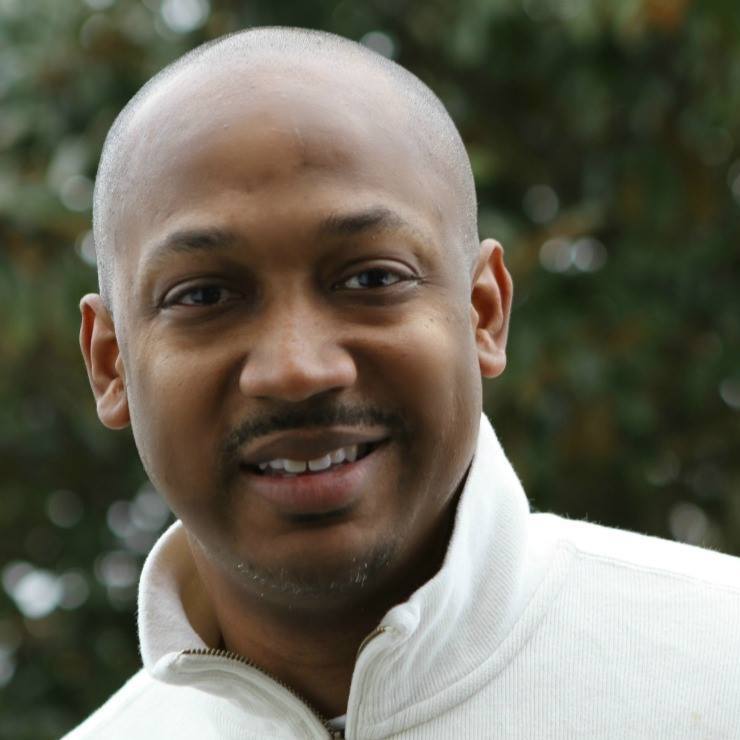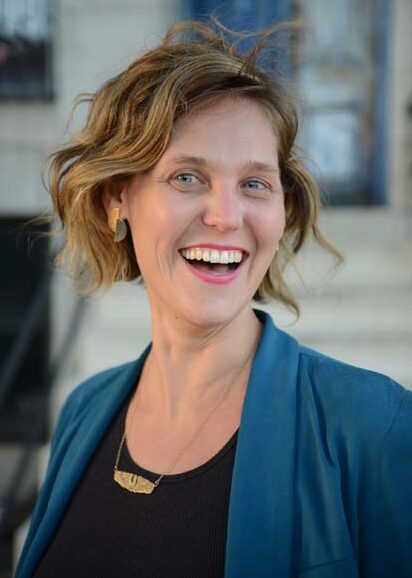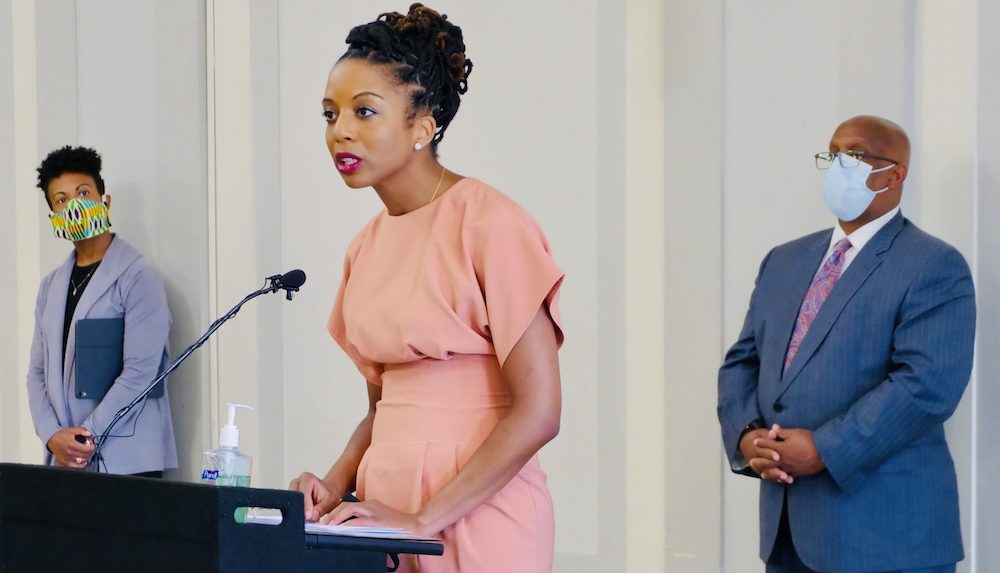Earlier this month, a longtime funder of human rights- and social justice-related initiatives announced the closure of its only field office in the United States — located at Saint Paul Plaza in the heart of downtown Baltimore — after a quarter of a century.
That office was known as Open Society Institute-Baltimore (OSI-Baltimore), whose name calls back to before the George Soros-founded philanthropic network was renamed the Open Society Foundations. Founded back in 1993 and self-identifying as a longstanding disruptor of Baltimore’s entrenched structural racism, OSI-Baltimore helped enable and fund several regional programs dedicated to the intersection of entrepreneurship and social impact.
In an email announcement, Danielle Torain, who became OSI-Baltimore’s director in 2020, said that she and colleagues have “decided not to view this development as a defeat but rather embrace it as a rare and timely opportunity.” That announcement also said that in the coming weeks, OSI-Baltimore will meet and speak with grantees, collaborators and others to solidify this “wind-down strategy.”
In addition, the grantor’s statements communicating its closing also listed a variety of transitional plans, including:
- An overall fundraising effort of $20 million to support the closure of this office
- A $10 million investment into legacy projects, including a version of its prior community fellowship program
- The CLLCTIVLY-created Maryland Black Futures Fund, described in a statement as “a new five-year, $100 million campaign to ensure that Black power-building and movement-based organizations in Baltimore and across the state of Maryland have the sustained investments and resources they need in their fight to eradicate systemic and institutionalized racism”
OSI-Baltimore was also known for its focus on the root causes of three intertwined problems in Baltimore: drug addiction, an overreliance on incarceration and obstacles that hurt young people’s ability to succeed in and out of the classroom. Given this focus, a question remains: Who will stand in the gap its closure leaves?
That question sits among many others, including what will happen to OSI-Baltimore’s office and if the organization left enough trackable change for those it granted or supported to continue its work with the same fervor.
Many socially minded grantmaking organizations and nonprofits lean on documents like impact reports to show what their work does. But word-of-mouth is still a powerful way to track such impact, so we asked some founders and changemakers who benefited from, did not benefit from or had other reflections on OSI-Baltimore’s work in the past few years. Here’s what some of them said:

Jamye Wooten. (Courtesy photo)
Jamye Wooten — Cofounder, CLLCTIVLY
Wooten, whose organization is one of the main ones involved with the OSI-Baltimore transition, emphasized the importance of building strong relationships and partnering with philanthropic entities in a way that honors the expertise and lived experience within the community. To continue this mission, CLLCTIVLY recently launched CONNECT, a nine-month cohort of ten organizations focused on deepening relationships and collaboration. This program was designed to help nonprofits in Baltimore City improve their sustainability, fundraising, and approach to serving young people through collaboration and a liberatory framework.
CLLCTIVLY will additionally host its recurring We Give Black Fest in August. The three-day convening features talks, panels, demonstrations and community-building activities — all centered around empowering the Black community in Baltimore City.
Danielle Tourain — Director, OSI-Baltimore
Although Tourain would not describe her exact professional plans following OSI-Baltimore’s closure, she emphasized her commitment to continuing the organization’s work, which she said helped solidify her commitment to working in the nonprofit world.
“Working with a black-led nonprofit in Baltimore gave me a deep commitment and sensitivity to the very real challenges faced by Black people in the nonprofit sector to secure the resources needed to fund and sustain their missions,” she told Technical.ly. “It fueled my desire to stay in this world and to continue this work. Knowing that less than 2.2% of philanthropic capital goes to Black-led institutions just fuels my desire to make sure we continue this work. For me, this is my life’s work, and I will continue to be anchored in Baltimore.”
Tourain also highlighted the $6 million seed sown into the Maryland Black Futures Fund, which allows Baltimore to tackle issues requiring targeted commitment.
“It puts Baltimore in a prime position for public and private investment, and at a scale that we haven’t seen for quite some time,” she added. “The question really is: Who will benefit from that investment? And how do we do everything within our power to make sure that undercapitalized and underresourced communities of Baltimore really maximize the benefits from this moment?”

Elijah Miles. (Courtesy photo)
Elijah Miles — Chairman, Tendea Family
In a recent statement, Elijah Miles, founder of Tendea Family, discussed the closure of the OSI-Baltimore office in the context of struggles that Black-led movements and organizations in Baltimore routinely face.
“Black movements and Black organizations wouldn’t have had the impact they had unless they had a group of people doing this as their nine-to-five,” said Miles, adding: “People don’t want to do work because we all work on a volunteer basis. That’s not sustainable.”
Miles also stated that the biggest need for these organizations and programs is both operations- and programming-related.
“We do the programs we do based on the resources we have,” he said. “It’s a struggle to build the programs we dream of because they require more resources than we have … Today, a family shouldn’t be forced to compete with established entities that have been around for hundreds of years and get all the money in the city.”

Michelle Geiss. (Courtesy photo)
Michelle Geiss — Cofounder and Executive Director, Impact Hub Baltimore
Geiss, a past applicant to OSI-Baltimore’s Community Fellowships program, acknowledged the immense privilege that the fellowship has provided to many leaders over the years.
“Decades of leaders have been afforded the tremendous privilege of following their dreams with 18 months of funding,” the leader of Impact Hub Baltimore said.
Geiss added that simply applying for the fellowship helped her to better strategize how to take Impact Hub Baltimore forward. While she recognized the “gap” that OSI-Baltimore’s closure would leave in the local landscape, she encouraged everyone to consider, as Technical.ly asked her, what OSI-Baltimore’s departure actually means to them individually and organizationally.
Join our growing Slack community
Join 5,000 tech professionals and entrepreneurs in our community Slack today!
Donate to the Journalism Fund
Your support powers our independent journalism. Unlike most business-media outlets, we don’t have a paywall. Instead, we count on your personal and organizational contributions.

Maryland firms score $5M to manufacture everything from soup to nanofiber

National AI safety group and CHIPS for America at risk with latest Trump administration firings

How women can succeed in male-dominated trades like robotics, according to one worker who’s done it


